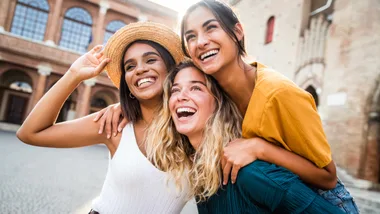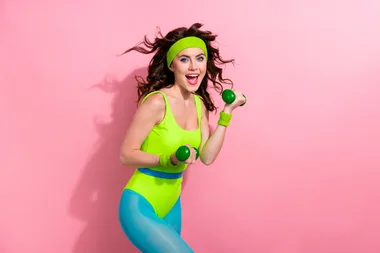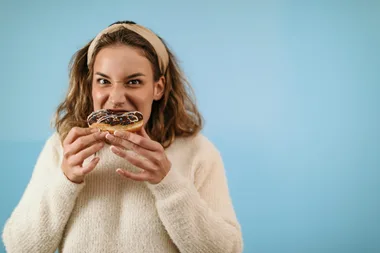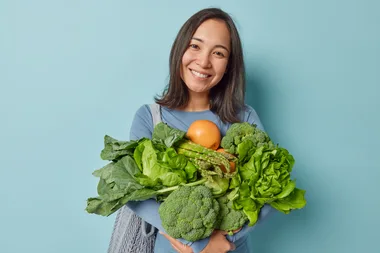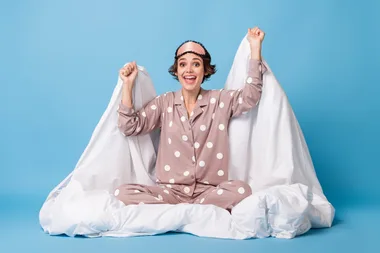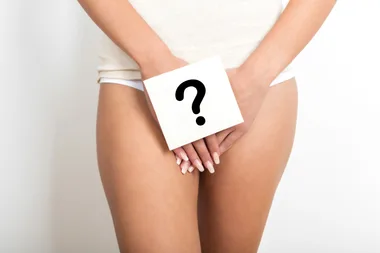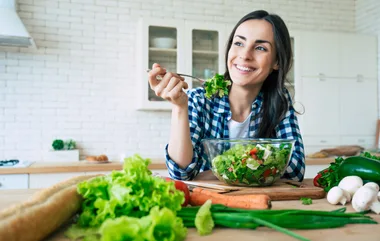News of Angelina Jolie’s preventative double mastectomy shocked the world, but to some women, it just makes sense. Like the actress whose mother died of cancer at age 56, these three young Australian women know what it’s like for cancer to interrupt their lives at a young age even though they may never develop it. They’re not careless with their health, but normal women who happen to have a family history of breast cancer.
Emily Clark, 26
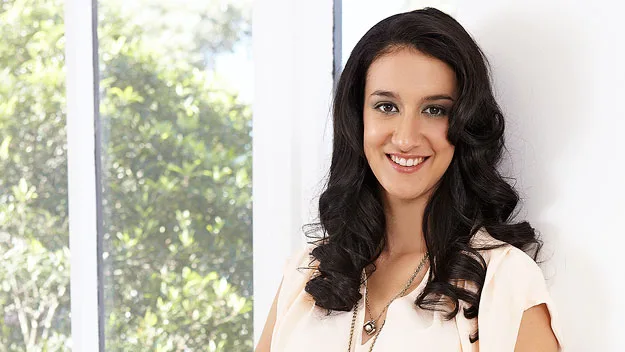
Emily believes she is going to get cancer. “I just accept it now,” she says. “I feel like my path is already laid out for me. It’s just a matter of time and it’s up to me to be prepared and take the precautions I can.”
This conviction comes from having a family history riddled with cancer. Her mother’s breast cancer diagnosis came when Emily was four years old, but she beat it, after having a breast removed. Sadly, her mum later developed liver cancer and Emily lost her when she was nine. Combined with a high rate of breast cancer among her eight paternal aunts and, more recently, losing her grandfather to leukaemia, cancer has long been a part of Emily’s life.
Yet it wasn’t until Emily turned 17 and moved away from home and family that she started hearing the term “high risk”, and the fear of getting cancer herself became a part of her life. Emily was suddenly visiting doctors to try and prevent herself from getting sick. “Growing up, I was fine,” she says now. “Then you start getting older and you start getting boobs. You have to have checks and hear this constant ‘You’re high risk’, but I didn’t actually know what that meant.
“It was so overwhelming because I didn’t really know how to deal with that stuff. I mean, I knew that I had to help myself, to get information, but I didn’t know how to do that or where to start.”
Instead of the routine of self-checks, six-monthly ultrasounds and scans she now adheres to, Emily let fear dictate her life and became obsessive about certain behaviours she naively thought would ward off cancer. “I would not eat certain preservatives and not use aerosol cans, and do these things I thought were right,” she says.
“I would not stand near a fridge when it was open and not stand near a microwave. I used to be totally mental about it. I lived, literally, in constant fear of getting cancer.”
After the confronting experience of losing her grandfather to cancer when she was 20, Emily went into “meltdown mode”, pulled her head out of the sand and found the information she needed to keep fear at bay. “For a while, denial would have been easier, but really, it’s excruciating not to know,” she says.
Now, Emily sees specialists at a breast cancer clinic every six months for a scan and ultrasound, attends regular counselling sessions and is a font of knowledge on the risks of getting cancer. She says the prospect of being diagnosed with cancer is far less scary. “I don’t worry about the stuff that’s out of my control now because the stuff in my control I’m taking care of and I trust the people that are helping me with that,” she says.
Knowing she can have some level of control over her high-risk status, Emily realised what she was missing wasn’t just information, but someone to talk to who was going through the same situation.
“There is such a gap in information out there,” she says. “A member of my family is missing and that’s the gap. It’s no one’s fault. That’s why I never really thought there was a solution. It’s such a personal situation that you feel like no one could possibly understand. You definitely feel like you’re going through it alone.”
Krystal Barter, 29

Emily Clark’s story is met with sympathy by Krystal because she’s been through it herself and she, too, thought she was the only one. Krystal’s mother, grandmother and great-grandmother were all diagnosed with breast cancer. After her mum was diagnosed when Krystal was 14, the teenager felt more than high risk — she felt cursed.
Yet, like many young women in the high-risk category, Krystal did not take preventative steps, preferring to ignore the problem. Finally, a life-change forced her to face it.
“When I met my husband, I thought, ‘I can’t keep putting my head in the sand. This is something real. I can make a real difference if I’m proactive’,” she says. “When I held my first baby in my arms, I realised I’m not just living for me,
I’m living for someone else, so I’ve got to be as healthy as I can.”
Krystal’s fear of developing breast cancer was heightened after she had her second son and underwent testing for BRCA1, a gene mutation associated with hereditary breast and ovarian cancers. She tested positive. “I suffered from extreme anxiety for a good year,” she recalls.
“I had vision problems, headaches, shallow breathing. I had them rush me to the medical centre because I thought I was having a heart attack and they put me on an angiogram, but there was nothing wrong with my heart. I just wasn’t dealing with the decision that I had to make and kept on really putting it off.”
The decision Krystal, then 25, was facing was whether or not to undergo a preventative double mastectomy, in order to decrease the risk of breast cancer by about 90 per cent. “It took me a long time to realise preventative mastectomy was an option for me,” she says. “It’s not easy for a young woman to decide to have her breasts removed.”
Only making Krystal’s decision more difficult was a lack of support while she was going through the decision-making process. “I just wanted that reassurance that what I was going through was normal,” she says.
“As much as my mum could say it’s all going to be okay, I just wanted someone I could lean on. The fact that there wasn’t anything out there for a woman like me who was high risk didn’t seem right.”
When a scan indicated a change in her tissue which could lead to the early stages of breast cancer, Krystal’s decision was made for her and she went in for the mastectomy. It was from her hospital bed after the operation that Krystal reached for her laptop and started Pink Hope.
“Sitting there, having had my breasts removed, I thought, ‘You know what? I’m not going to feel sorry for myself. I’m going to feel sorry for the women out there who can’t chat to me, who can’t connect with someone who understands’.”
Now Krystal connects with women at high risk of breast and ovarian cancers through her online Pink Hope Community, offering support and information. When Krystal went to the National Breast Cancer Foundation with her idea, they agreed to help Pink Hope by directing some ongoing funding towards it.
Since the mastectomy and starting Pink Hope, which is now her full-time job on top of looking after three children under five, Krystal’s life has changed for the better.
“I didn’t like my breasts,” she says. “Not only because they’d had the life sucked out of them after breastfeeding. They just felt like a ticking time bomb. I felt that there was this burden, this big dark cloud. Once I had them removed, I’m happy every day.”
Though Krystal stresses she doesn’t recommend preventative mastectomy for everyone, it was the right decision for her. Her hope is to provide the means for support and communication between women in a similar position and create better awareness of the risks and preventative measures available.
Above all, what Krystal wants is instead of her daughter Bonnie going in for testing at age 18 to discover if she too is BRCA1 positive, she can book in for a vaccination. “We’ve got 18 years to make it happen. That’s ideally what I’d like,” Krystal says.
For more information on the Pink Hope Community, visit pinkhope.org.au.
Gretel Maltabarow, 21
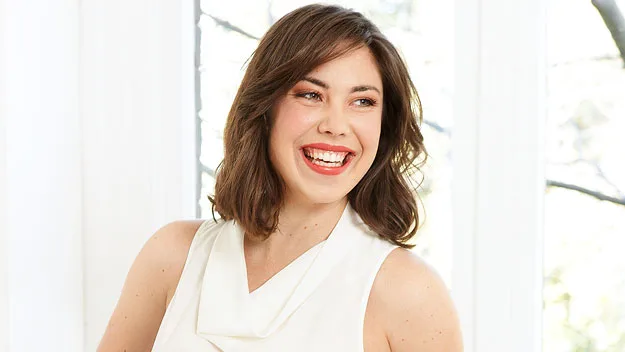
No doubt, Krystal Barter would be happy if her daughter, Bonnie, grew up to have as sophisticated and realistic an understanding of being at high risk of breast cancer as Gretel. When she was only 10 years old, her mother, Amanda, survived her battle with breast cancer and went on to become an NBCF ambassador. Along the way, she equipped her three girls with a strong understanding of breast cancer and what their family history might mean for them.
Amanda comes from a long line of fighters, getting her indomitable spirit from her own mother and other close female relatives who have been affected by and survived breast cancer. And Gretel seems to have inherited her mother’s strength, too.
“When I think about it, I don’t think I’m going to get really sick from breast cancer or die from it,” Gretel says.
“I think if I get breast cancer I’m going to deal with it and I’ll be a survivor like my mum and grandmother, my aunty and my whole family.
“It’s in our genes and I’m sure when I’m at the age where I could get it, the technology is going to be better and there might even be a cure. It might happen to me, but I wouldn’t say I’m overly worried about the consequences of it.”
Gretel has grown up in a supportive and open environment when it comes to talking about breast cancer, and she counts herself lucky. “It’s so important to have that kind of education,” she says.
“I can only imagine what it would be like for people who have had mothers who have had breast cancer who don’t talk about it, or who don’t have a mum around any more. It’s not their fault if they’re ignorant.
“If my mother wasn’t involved with charity work, I probably wouldn’t know a lot about it. It would be quite scary if you were in the dark about breast cancer, but that’s what’s so good about these charities working towards greater awareness, so people can talk about it.”
Like Emily Clark and the hundreds of young women who have found a valuable resource in Pink Hope and other support options, such as Cancer Australia’s website myparentscancer.com.au, Gretel sees a need for a platform to discuss the issues and provide a support network for those forgotten victims of breast cancer.
“For me, it’s not about cancer itself,” Emily says. “It’s about giving people the information they need to have a bit of power over what happens to their body. The biggest thing for me is you can’t control it. You work hard, you get the jobs you want, you study the things you want and you have the relationships you want, but you can’t control this, so it’s scary when you think about it like that.
“This is a way not to be scared, to have people around you who think it’s normal. Because it is — it is normal.”

